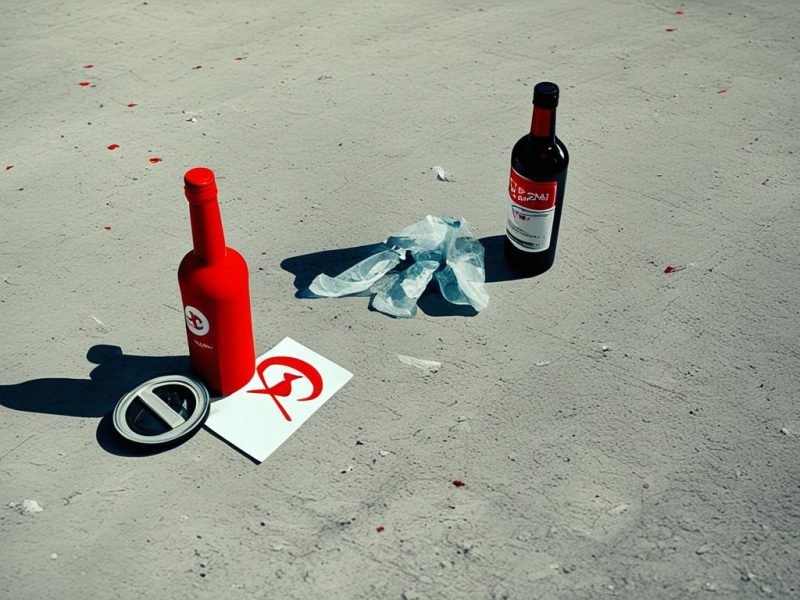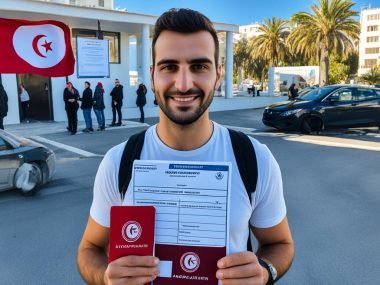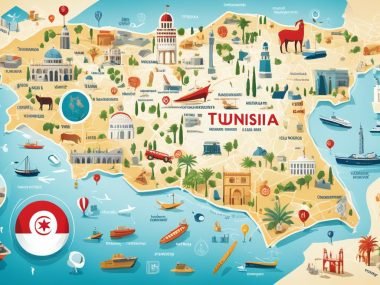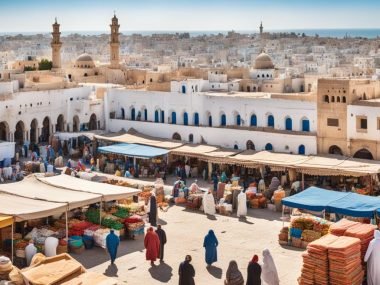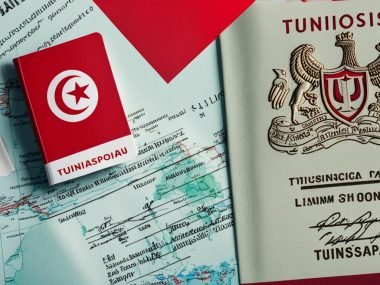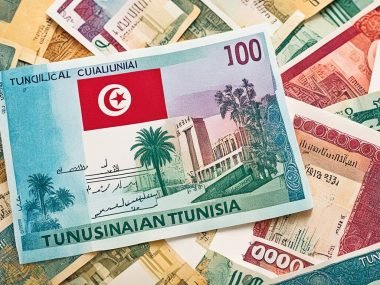Did you know less than half of Tunisia is safe for travel? It’s important to know what’s not allowed there. This keeps our visit both safe and respectful.
Tunisia has beautiful places and a deep history. But, it also has strict rules. The FCDO says not to go to some places like the Chaambi Mountains National Park. This is because of security dangers.
It’s not just about the places. There are cultural rules and legal limits we must follow too. Understanding these can stop us from breaking the law by accident. This might also keep our travel insurance valid.
Before we go, let’s learn the important rules of Tunisia. This will make our trip smooth.
Key Takeaways
- Travel to some parts of Tunisia is not advised by the FCDO due to dangers.
- Going to banned places could make our travel insurance useless.
- We need to be careful about how we dress and act in public.
- There are serious laws about drugs and buying property in Tunisia.
- Health rules in Tunisia can change depending on the area; it’s vital to stay informed.
Legal Restrictions and Prohibited Actions
When you visit Tunisia, it’s very important to know and follow the laws there. Not knowing them is no excuse. We will tell you what to watch out for.
Drug Offences
Tunisia is very strict about drugs. Even small mistakes can lead to big trouble, like fines or jail. Don’t get caught with drugs in any way.
Buying Property
Thinking about buying a house there? There are strict rules for foreigners. Make sure to get advice from a local expert to avoid problems.
Use of Cameras in Secure Areas
You can’t take photos or videos near certain places, like government or military sites. Doing so can get you arrested. Always ask for permission if you’re unsure.
In short, knowing and following Tunisia’s laws helps you stay out of trouble. Be careful and enjoy your visit without any problems.
Travel Advisory: Restricted Areas
Tunisia is a beautiful place to visit. But, some areas are not safe. It’s very important to know which areas to avoid.
Western Tunisia & Algeria Border
The Western Tunisia-Algeria boundary has risky spots. Places like Kasserine and Jendouba need to be avoided. This is due to terrorist threats and lots of military actions.
Southern Tunisia & Libya Border
In Tunisia’s south, close to Libya, there’s danger too. The unrest in Libya makes these areas risky. A strong warning is given to avoid travelling there.
Military Operations Zones
Areas with military operations are extra risky. These zones are especially dangerous. You must follow travel advice strictly and stay away from these spots.
| Region | Associated Risks | Advisory |
|---|---|---|
| Western Tunisia & Algeria Border | Potential terrorist activity, military operations | Avoid all travel |
| Southern Tunisia & Libya Border | Volatile security situation in Libya | Avoid all travel |
| Military Operations Zones | High security measures | Avoid all travel |
Cultural Sensitivities and Dress Code
It’s very important to understand and respect Tunisian cultural practices. Tunisia, a mainly Muslim country, has specific rules for visitors. Following these rules helps avoid cultural mistakes.

Appropriate Attire
When visiting Tunisia, it’s key to follow the Tunisia dress code. This is especially true in religious places and the countryside. For men and women, clothes should cover shoulders and knees. This shows respect for local customs. It also shows we value Tunisia’s cultural sensitivities deeply.
In tourist spots like resorts, dressing conservatively is less strict. But being cautious is always wise.
Behaviour During Ramadan
During Ramadan, respecting local customs is crucial for non-Muslim visitors. Not eating, drinking, or smoking in public during the day is important. This shows we respect behaviour during Ramadan in Tunisia.
By respecting Tunisian cultural practices in Ramadan, we make our visit respectful and peaceful.
Safety Measures: Avoiding Crime and Harassment
Visiting Tunisia means knowing the local safety tips. This knowledge makes your trip smoother and safer. Let’s look at how to avoid petty crime and harassment.
Petty Crime
Tunisia is mostly safe but watch out for petty crime. This includes pickpocketing and bag snatching in busy areas. Keep your valuables safe to lower the risks.
Using a bag that goes across your body helps. Also, don’t show off your expensive stuff.
Sexual Harassment and Assault
Visiting Tunisia is usually safe. Still, know about the sexual harassment laws. More incidents happen in summer, so always be alert.
Tourists, especially ladies, should avoid lonely places at night. It’s safer to be with others. Tell the local police if you face any trouble.
To stay safe, stick to bright, busy places. Be careful with help from strangers. Know the local emergency numbers just in case.
What Are You Not Allowed To Do In Tunisia?
When visiting Tunisia, knowing the rules for tourists is key. This makes your trip smooth. Learning about Tunisia travel guidance helps avoid problems in this beautiful country.
Taking photos near sensitive spots like government buildings is a no-no. If you don’t follow these rules, you could face fines or worse. So, it’s really important to know and follow Tunisian law compliance. Drugs are also a big issue. Tunisia has very strict laws against having or selling drugs.
It’s also good to be mindful of local customs when visiting Tunisia. Dressing properly and not being too affectionate in public is advised.
Knowing which areas to avoid is crucial, especially near the borders with Algeria and Libya. Staying safe means listening to advice from local officials about these places.
Here’s a quick recap of our Tunisia travel guidance:
- Avoid taking photos near government or military sites.
- Strictly comply with drug laws to avoid severe penalties.
- Respect cultural norms regarding dress and public behaviour.
- Be vigilant in high-security risk areas near border zones.
Staying informed and respectful about tourist conduct in Tunisia makes your visit better and safer.
Driving Regulations and Transport Risks
Driving in Tunisia lets you see its beautiful coasts and deserts. But, you must know the local driving rules and risks. This makes sure you have a great time.
Driving Permit Requirements
You need an International Driver’s Permit in Tunisia to drive. It’s a must for foreigners. Get it before you come to avoid problems. With it and your own licence, you can drive legally.
Road Safety and Conditions
It’s very important to be careful about road safety in Tunisia. Roads in cities are usually good. But in the countryside, they can be bad. Watch out for poor lighting and speed bumps.
Driving safely is key. Local drivers might surprise you. So, always be ready for anything when you’re driving here.
Here’s a look at road safety in cities and countryside:
| Factor | Urban Areas | Rural Areas |
|---|---|---|
| Road Conditions | Generally Good | Variable, Often Poor |
| Lighting | Adequate Street Lighting | Poorly Lit |
| Traffic Control | Regulated Intersections | Few Traffic Signals |
| Common Hazards | Pedestrians, Scooters | Livestock, Unmarked Speed Bumps |
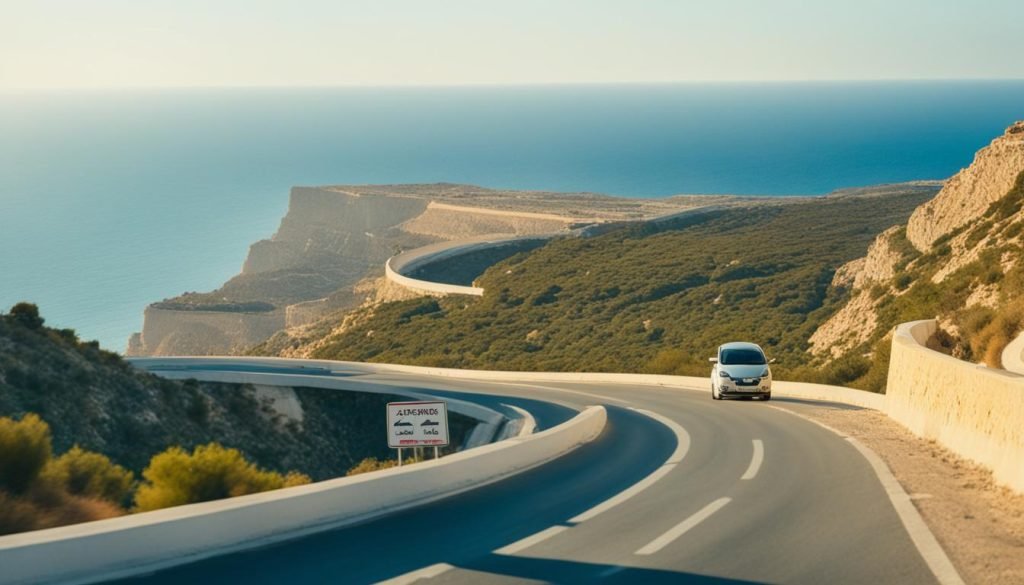
It’s not a good idea to drive at night outside cities. The risks are higher then. Unlit roads and stray animals can be dangerous. Always be alert and choose well-known roads.
Alcohol Consumption Rules
Tunisia has special rules for alcohol. It’s known for its culture and history. There are restrictions on alcohol sale in Tunisia. These affect when and where you can buy and drink alcohol.
On Fridays, supermarkets can’t sell alcohol. This is because Friday is a holy day. During Ramadan, Tunisia alcohol consumption laws get even stricter. Supermarkets stop selling alcohol completely. But, hotels and bars with licences still serve alcohol.
It’s important to know these drinking rules in Tunisia if you visit. Being mindful of these rules shows respect for Tunisian culture. When purchasing alcohol in Tunisia, check with places about when it’s okay to buy. This is especially true on Fridays and during Ramadan.
Getting to know the Tunisia alcohol consumption laws makes visits better. It helps us respect local ways while enjoying what Tunisia offers.
LGBT+ Travellers: Legal and Social Considerations
When you plan to travel as an LGBT+ to Tunisia, it’s key to know the laws and social feelings there. Knowing about the legal view on same-sex relations in Tunisia and how people feel can help make your trip safer and more respectful.
Legal Status
The laws in Tunisia can be tough for LGBT+ travellers. Same-sex relationships are against the law. The Tunisian Penal Code, in Article 230, says acts of homosexuality can lead to jail time. So, it’s very important for LGBT+ people to be careful. Don’t share your sexual orientation or relationship details in public to stay out of trouble.
Social Sensitivities
Tunisia also has social challenges for LGBT+ people. Even though Tunisia is doing better in human rights, many don’t accept LGBT+ people. There’s a lot of prejudice and unfair treatment. So, showing love in public or being open about your LGBT+ identity can be risky. In understanding Tunisian laws and social views, staying low-key is smart.
Knowing about the laws and how people feel can help with these challenges. It’s important to stay informed and careful. This helps make sure you have a safe and happy visit to this beautiful country.
Public Gatherings: Strikes, Protests, and Demonstrations
When you go to Tunisia, knowing about public events like strikes and protests is key. These events happen often and sometimes start suddenly. They can change local services and be risky. So, it’s smart to know the rules about public gatherings in Tunisia for a smooth trip.
Strikes and Industrial Actions
Strikes happen a lot in Tunisia. They can impact things like buses and government services. If you’re visiting, check if there are any strikes happening. This way, you can make good travel plans. Try to avoid strike areas to stay safe and free from trouble. Following local advice is a good plan for your safety.
Protests and Demonstrations
Protests show the country’s active community life. They can be calm or intense. If you’re touring, it’s best not to join protests. Watching from afar and listening to local warnings is safer. This keeps you out of trouble and away from legal problems.
To wrap up, being careful and informed about strikes and protests in Tunisia is very important. Knowing what’s happening and following local tips helps us stay safe and respect the area.

